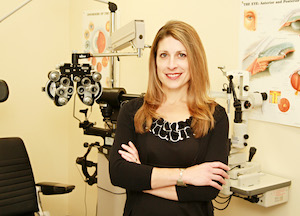Nutrition and Macular Health
 Christine A. Zlupko, O.D.
Christine A. Zlupko, O.D.
“Dietary changes may be the most practical and cost-effective prevention method to combat progression of age-related macular degeneration.”
Allen Taylor, PhD, Director of the Laboratory for Vision Research, USDA
There have been several studies focusing on preventing the progression of age-related macular degeneration (AMD). This disease can be devastating since it damages the area of the retina that provides clear central vision. It affects a person’s ability to read, drive and even recognize faces. AMD comes in two forms, wet and dry, and occurs when the retina is damaged due to deterioration of retinal cells (dry form) or to leaking blood vessels in or under the retina (wet form).
Almost every single one of the risk factors for AMD can be linked to the production of free radicals within the body. Potential sources of this oxidative damage are aging, inflammation, air pollutants, cigarette smoke, and sustained sunlight exposure. Free radicals can be neutralized by antioxidants before they can cause damage which is why the research points to the importance of incorporating antioxidants into our diets. There are several vitamins and minerals that are recommended to prevent oxidative damage within the structures of the eye. Common antioxidants are vitamins A,C and E as well as lutein and zeaxanthin.
Beta carotene, which is converted by the body into vitamin A, is an important antioxidant that resists oxidative stress damage to cells and tissues, including those of the retina (causing AMD). Beta carotene can be found in apricots, blueberries, cantaloupe, peaches, carrots, squash, broccoli and sweet potatoes.
Many fruits and vegetables are excellent sources of vitamin C including citrus, strawberries, papaya, tomatoes and green and red peppers. Vitamin E is more difficult to obtain from food sources alone, but can be found in vegetable oils (saffron and corn) as well as in almonds, pecans, wheat germ and sunflower seeds.
Lutein and zeaxanthin are two carotenoids that make up the macular pigment. The macular pigment protects the macula from the damaging effects of ultraviolet and blue light. They are often found together, primarily in green, leafy vegetables (collard greens, spinach and kale). They can also be found in egg yolk, broccoli, orange peppers, corn, peas, persimmons and tangerines.
What about vitamin supplements?
Supplements of these nutrients are fine in the form of a multivitamin for those individuals with earlier than intermediate-stage macular degeneration. However, obtaining them through a balanced diet is a better option due to the healthy dose of fiber contained in the fruits and vegetables consumed. Always discuss taking a vitamin supplement with your doctor before you begin.
For those who have already been diagnosed with intermediate AMD, the Age Related Eye Disease Study (AREDS) studied the effects of vitamins C&E, beta carotene, Zinc and Copper on the incidence and progression of the disease. It determined that high doses decreased the risk of developing advanced AMD and decreased the risk of moderate vision loss. These supplements do not prevent the development of AMD, nor can one recover vision already lost. AREDS 2, a new study, recommended removing beta carotene due to a concern of a link to lung cancer in smokers. They added lutein and zeaxanthin to the mix.
In summary, you should incorporate plenty of green, leafy vegetables into your diet, some nuts and yellow and orange fruits and vegetables. The health of your retina is a reflection of the health of your entire body. If you have weak blood vessels, degeneration or inflammation in your eyes, the same process is occurring in the rest of your body as well. So, good nutritional habits, not only benefit the health of your eyes, but positively affect your entire body.